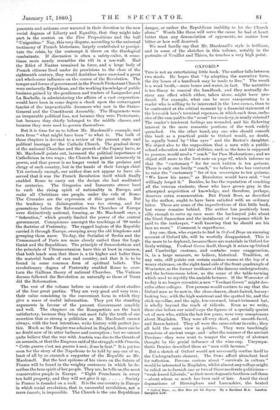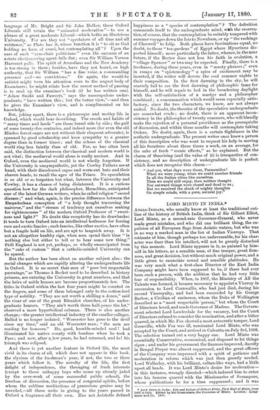OXFORD.* Tuts is not an entertaining little book. The author
falls between two stools. He hopes that " by adopting the narrative form, the dry bones of a handbook may be made to live." The result is a weak broth,—mere bones and water, in fact. The narrative• is too flimsy to conceal the handbook, and they mutually de- stroy any effect which either, taken alone, might have pro- duced. For example, what can be more exasperating to a reader who is willing to be interested in the love-scenes, than to be confronted at the critical moment by a financial statement of the love-sick hero's terminal expenses, in which each item, inclu- sive of the sum paid to the "scout" for crockery, is neatly entered P The reader's tenderest feelings are wounded, and his flickering interest in the more romantic portions of the work rudely quenched. On the other hand, any one who should consult this book as a practical guide to Oxford would, no doubt, be equally bored by "blue eyes" and the Rector's daughter. We object also to the supposition that a man with a public- school education and fair abilities, such as the hero is supposed to possess, would need a " coach " for Pass Moderations ; and we• object still more to the foot-note on page 87, which informs us that the " customary " fee for such tuition is ten guineas. There is only one hardy " coach," we believe, who has ventured to raise the " customary " fee of ten sovereigns to ten guineas. " We know his name," as Herodotus would have said, " but willingly forget it." Besides, he has the reputation of coaching all the veteran students, those who have grown grey in the attempted acquisition of knowledge, and therefore, perhaps, deserves extra remuneration. But Frank Ross, as described by the author, ought to have been satisfied with an ordinary tutor. These are some of the imperfections of this little book, but worse remains behind. The author has positively been silly enough to serve up once more the hackneyed joke about the Good Samaritan and the instalment of twopence which he paid to the innkeeper, " well knowing that he should see his face no more." Comment is superfluous.
Any one, then, who expects to find in Oxford Days an amusing account of Oxford life, will be woefully disappointed. This is the more to be deplored, because there are materials in Oxford for lively writing. Verdant Green itself, though it mixes up Oxford and Cambridge customs, and contains some exaggeration, ;s, in a large measure, we believe, historical. Tradition, at any rate, still points out certain sunless rooms at the top of a weary staircase, on the right-hand side of the front quadrangle of Worcester, as the former residence of the famous undergraduate, and the lecthre-room below, as the scene of the table-turning- which used to mystify the amiable lecturer. If the Worcester of to-day is no longer eccentric, a new " Verdant Green" might des- cribe other colleges. Few persons would venture to say that the Oxford man as he now is, the close-shaven, short-haired, horsey: looking boy, with the high waistcoat and the spotted tie, and the stick-up collar, and the ugly, low-crowned, broad-brimmed hat, is wholly beyond the reach of ridicule. Even as we write, there rise before our mind's-eye the figures of a specially quaint set of men who, within the last few years, were very conspicuous
about Magdalen. They were all very short, and smooth-faced, and flaxen-haired. They all wore the same colour in suits ; they all held the same view in politics. They were touchingly tenacious of ancient usage, and—after the manner of the ancient Persians—they were wont to temper the severity of abstract thought by the genial influence of the wine-cup. Unsympa- thetic Demies described them as " men with lacunas."
But a sketch of Oxford would not necessarily confine itself to the Undergraduate element. The Dons afford abundant food. for reflection. Persons curious about " survivals in culture " would be interested in Magdalen, whilst almost any college might be relied on to furnish one or two of those moderate politicians— "weak-kneed Liberals," as their more dogmatic brethren call them —about whom so much has been said of late. Amid the rival dogmatisms of Birmingham and Lancashire, the heated
• Orford Days; or, How ROSS got hie Degree. By a Resident KA. London Sampson Low.
language of Mr. Bright and Sir John Holker, these Oxford Liberals still retain the " animated moderation "—to use a phrase of a great moderate Liberal—which befits an illustrious University. For are they not " spectators of all time and all existence," as Plato has it, whose function it is " to sit as God holding no form of creed, but contemplating all " ? Upon the ears of such " arm-chair politicians " even the sarcasm of an astute electioneering agent falls flat ; even Sir William Vernon Harcourt palls. The spirit of Arcesilaus and the New Academy is too strong in them ; besides, have they not heard, on high authority, that Sir William " has a fine voice, a commanding
presence and—no convictions." Or again, the would-be satirist might turn his attention even to the august body of Examiners ; he might relate how the surest method of passing is to read up the examiner's book (if he has written one). 4‘ Adam Smith and Fawcett," says the unscrupulous under- graduate, " have written this ; but the better view,"—and then he gives the Examiner's view, and is complimented on his knowledge.
But, joking apart, there is a picturesque and motley life in Oxford, which would bear describing. The creeds and habits of 4' many times and lands " are those found side by side ; the gulf of some twenty-five centuries, and indeed more (for even the old Hindoo forest-sages are not without their eloquent advocate), is spanned by good scholarship and keen sympathy to a greater degree than in former times ; and the echoes of the classical world ring less faintly than of old. For, as has often been said, the distinction between the'classical and modern world is not vital ; the mediaeval world alone is really ancient. And in Oxford, even the mediaeval world is not wholly forgotten. If the University is unsympathetic, yet the Cowley Fathers are at hand, with their discoloured capes and worn-out hats and their shaven heads, to recall the ages of the Friars. No speculation is so old or so forgotten but what, between the University and Cowley, it has a chance of being disinterred. It is a curious question how far the dark philosopher, Heraclitus, anticipated one of the latest German writers, when he called religion " sacred disease ;" and what, again, is the precise difference between the Elopedocleaa conception of " a holy thought traversing the universe," and the " stream of tendency not ourselves making for righteousness " of the modern Oxford Professor of " sweet- ness and light ?" No doubt this receptivity has its drawbacks; it tends to turn Oxford into an intellectual hothouse for forcing rare and exotic fancies ; such fancies, like other exotics, have often but a fragile hold on life, and are apt to languish away. It is not an"altogether healthy sign, when men spend their time "in nothing else but either to tell or to hear some new thing." Still England is not yet, perhaps, so wholly emancipated from the " cake of custom " that a catholic-minded University can be spared.
But the author has been silent on another subject also : the social changes which are rapidly altering the undergraduate life in Oxford. It is no secret that men of "poor but respectable parentage," as Thomas a Becket used to be described in history primers, are entering the University in great numbers, and that the heirs of noble houses are become proportionately few. The titles in Oxford within the last four years might be counted on the fingers, and some of them belonged only to the cotton-lord type of nobility. " They are not worth a shilling a dozen," said the vicar of one of the great Ritualist churches, of his under- graduate hearers. "They ain't worth three half-pence the lot," observed a more hyperbolical cabman. There is also another change,—the greater intellectual industry of the smaller colleges. Balliol is no longer isolated. " Worcester has gone to the devil since my time," said an old Worcester man; " the men are reading for honours." He, good, humble-minded soul ! had illuminated his native county with bonfires when he took a Pass ; and now, after afew years, he had returned, and lo ! his triumph was eclipsed.
And there is yet another feature in Oxford life, the most vivid in its charm of all, which does not appear in this book, the elysium of the freshman's year, if not, the two or three years which follow it. The novelty of the life, the first delight of independence, the thronging of fresh interests (except to those unhappy boys who come up already jaded by the over-work of some successful public school), the freedom of discussion, the presence of congenial spirits, before whom the sublime meditations of precocious genius may be unveiled,—all these unite in giving to the years passed in Oxford a fragrance all their own. Has not Aristotle defined happiness as a " species of contemplation" P The definition commends itself to the undergraduate mind, with the reserva- tion, of course, that the contemplation be suitably tempered with summer voyages down the Isis to Newnham, or up " the rushings of Cherwell" to Islip. Both places have fascinations equal, no doubt, to those "tea-gardens " of Egypt where Mycerinus dis- ported himself ; more particularly the latter, whence, in the near future, if the Rector does not lose his faith in evolution, a "village Spencer" or two may be expected. Finally, there is a freshness, during these years, even in " musty phrases ;" even in essays on " epistemology " a spice of excitement may be inserted, if the writer will devote the cool summer nights to their composition. In the first dawning in the sky, he will scarcely fail to see the first dawning of philosophic fame for himself, and he will repair to bed in the broadening daylight with the self-satisfaction of a martyr and a philosopher combined ; a consummation which would seem especially satis- factory, since the two characters, we know, are not always united. No doubt, the theories of the speculative undergraduate are somewhat crude ; no doubt, there is an apparent incon- sistency in the philosopher of twenty summers, who will blandly make the rejection of a personal providence as the prerequisite of discussion, and within three months will contemplate taking Orders. No doubt, again, there is a certain flightiness in the (esthetic undergraduate. The present writer once knew a person of this description who was wont to request his help in moving all his furniture about three times a week, on an average, for the sake of fresh " scenic effects," as he explained. But the charm of theorising (and the value of it) is irrespective of con- sistency, and no description of undergraduate life is perfect which does not recognise this charm :-
" And yet, what days were those, Parmenides !
When we were young, when we could number friends In all the Italian cities like ourselves.
Then we could still enjoy, then neither thought Nor outward things were closed and dead to us ; But we received the shock of mighty thoughts On simple minds, with a pure, natural joy."



































 Previous page
Previous page